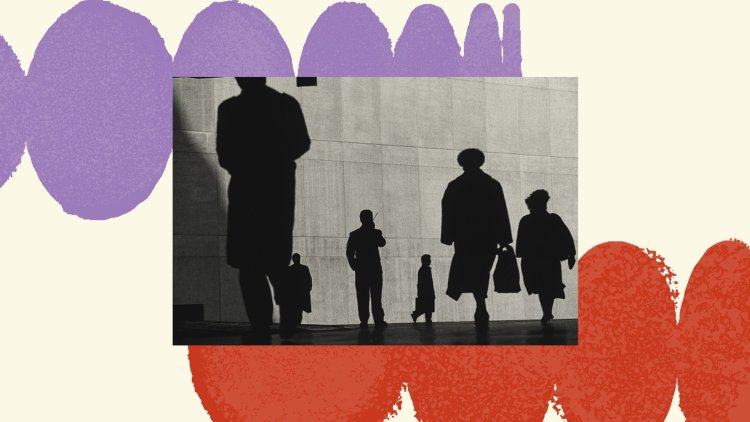What Cities Can Teach Us About Life Online
Learning to live online is a lot like learning to live alongside one another in cities.

Digital life is a social experiment full of contradictions. It can connect people while alienating them; embrace difference while policing change; span huge distances but feel small.
Humanity’s transition to life online is disorienting, but perhaps not without comparison. According to the researcher danah boyd, people faced similar challenges in the transition to city life, meaning that the history of urbanization can offer lessons for humankind’s more recent mass digital migration.
And if the rules and ways of cities have become clearer over the years, maybe there’s hope that the same can be said for life online.
Boyd’s work is the focus of a recent episode of The Atlantic’s podcast How to Know What’s Real, with co-hosts Megan Garber and Andrea Valdez. This week, Radio Atlantic is showcasing that episode, with an introduction by host Hanna Rosin.
Listen to the episode here:
Subscribe here: Apple Podcasts | Spotify | YouTube | Google Podcasts | Pocket Casts
The following is a transcript of the episode:
[Music]
Hanna Rosin: I’m Hanna Rosin. This is Radio Atlantic, and today we’re going to do something special. I’m going to introduce you to our latest season of The Atlantic How To podcast. This season is called How to Know What’s Real. And with me today in the studio is one of the hosts of the new season, Atlantic staff writer Megan Garber. Hi, Megan!
Megan Garber: Hi. Glad to be here.
Rosin: So, Megan, I’m going to tell you a story.
Garber: Okay. Oh, yes, please.
Rosin: The other day, I was sitting in a giant, urban food hall, and I was sitting there with my partner. It was like Saturday or Sunday. It was very crowded. And she’s telling me an incredibly, like, heated story about somebody who she got into a fight with.
And it’s like, she’s getting kind of like more and more heated up and it’s like: F-bomb! F-bomb! F-bomb! She has a loud voice anyway, and somebody—a total stranger—sits down at the table next to us with her children, who were teenagers, not kids.
Garber: Uh-oh.
Rosin: And she looks over, and she says, “Could you stop cursing?”
Garber: Ooh.
Rosin: Exactly. And I spent a week thinking about this. Like, what are the rules in that situation?
Garber: (Laughs.) Yeah. Ooh.
Rosin: This is a giant, urban environment. Like, you are supposed to come into contact with strangers. The rules of how to behave are totally unclear. My partner can tell whatever story she wants in whatever way she wants.
And, like, here is the mom coming in and making this request. And it was just very complicated, I suddenly realized, to navigate this crashing of strangers into each other.
Garber: Oh, yes. And can I ask: What did you do in that moment? Did you respond to the woman? Did, or did your partner—
Rosin: God, I mean, if you met my partner, you would know the answer to this question. (Laughs.) She was like, Hell no, and you can move over there if you want to, because this is a public— and I was, like, just hiding under the table.
Garber: (Laughs.) That’s right. I’m going to go get some water. Okay. Bye.
Rosin: Exactly. That’s how that story ended. Anyway, Megan. The reason I’m telling you this story is because it turns out that navigating cities and all of these complicated dynamics that happen in cities is a lot closer to navigating an online space than a lot of people realize.
Garber: Yes, exactly. And I think that’s also in part because, you know, the web is in some ways so new, so unprecedented, right? But in other ways, the challenges it presents—despite all the new technology—are challenges that people have faced before, right? They’re sociological challenges, really, in kind of fundamental ways—questions about how people see each other, or fail to see each other, or make space for each other, or can’t make space for each other.
And so I love this idea of history as almost giving a little bit of context and perhaps a little bit of hope, too, in terms of how we can navigate these really big, new questions that are, in some ways, very old questions, too.
Rosin: How does this specific episode fit with the wider goal of this season?
Garber: So much of this season really is about making these connections between things that might seem separate at first. So, you know: fantasy and reality, the web and the physical worlds, cities and the web.
My co-host, Andrea Valdez, and I wanted to really put the web, and all the questions it brings up, into a new kind of context and perspective. And spoiler: We are not going to fully answer how to know what’s real. But we’re hoping that we can help to clarify where the reality is among the things that might not seem fully real.
Rosin: So, listeners, here’s Episode 2 of the latest season of How To: “How to Live in a Digital City.”
Rosin: So that was Episode 2 of the new season of The Atlantic’s How To podcast.
Links to subscribe are in the show notes for this episode, or you can search your podcast app for How to Know What’s Real.
This episode of Radio Atlantic was produced by Kevin Townsend, edited by Claudine Ebeid, and engineered by Rob Smierciak. Claudine Ebeid is the executive producer of Atlantic audio, and Andrea Valdez is our managing editor. I’m Hanna Rosin. Thank you for listening.
What's Your Reaction?




















